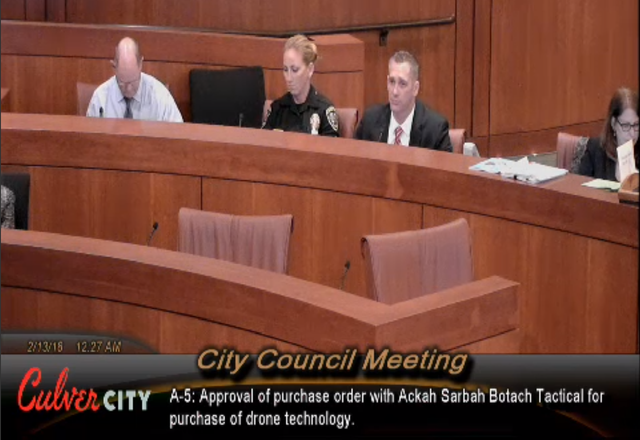Opinion: Culver City Council Does the Right Thing on Drones – For Now
 Captain Jason Sims of the Culver City Police Department Presents the Written Policy to the Culver City Council
Captain Jason Sims of the Culver City Police Department Presents the Written Policy to the Culver City Council
Aware of the dubious optics inherent in buying police surveillance drones at 2 AM, the Culver City Council rightly decided to delay voting on a purchase for 8 camera-equipped drones. At least for now. The decision to table, made in the early hours of Feb 12, marks the second time they’ve postponed a vote, and the second time that decision came later than midnight.
Beyond concerns about the late hour, some councilmembers cited a need for greater community conversation before approving the Culver City Police Department’s (CCPD’s) request for strident new surveillance powers. Again, sensible to call for more public dialogue – but again, not the first time. Earlier promises for substantial outreach on this item – and on a separate CCPD bid for automatic license plate reader (ALPR) cameras – never materialized.
When making those promises in their Jan 8 meeting, the council primarily professed concern over a lack of written policy on how the surveillance technologies would be used – and more importantly, how citizens’ constitutional privacy would be protected.
At the February meeting, the CCPD came with a written policy. Unfortunately, just because a policy is written does not mean it’s good. The document, riddled with qualifiers and vague language, possesses all the bite of an earthworm. Reading it gives the impression the policy was written by police officers, not policymakers.
Here’s why that’s a problem. Drone technology will fundamentally change how the CCPD conducts its business. Maybe it takes a year, or two, or ten – but it is bound to happen.
Without constraint, the police have little rationale not to use drones in most routine work. As written, the policy makes no effort to restrict drone use to specific, justified circumstances. The “included but not limited to” list of use cases is 13 items long.
Perhaps there is pressing need for drones in all 13 different situations. In presentations to the city council, however, the police have provided little affirmative justification for why drones are necessary tools for maintaining public safety. Looking at the examples they offered in council makes clear even they don’t have clear reasons for wanting drones.
The codified policy must be characterized by limits, not liberty. But before we even talk policy, the onus is on the CCPD to prove why drones are critical tools for preserving public safety.
For example, Chief of Police Scott Bixby repeatedly explained drone policy with the example of spotting a “meth lab” in a Culver City backyard. I wasn’t aware meth production was a vital danger threatening the citizens of Culver City – were you? Or how about Captain Jason Sims, who gave the following example when justifying Chief Bixby’s unilateral control over how and why drone footage is released to the public:
“[Imagine] we have a high-profile incident that is being inaccurately portrayed in the media, and we have video that refutes and disproves the inaccuracies,” said Sims. “We feel releasing that video […] is in the best interest of the City, the Department, and possibly could prevent some type of civil unrest.”
There you have it. The CCPD needs drones to find non-existent meth labs and to stop fake news. Note that Captain Sims didn’t say video of a “high-profile incident” (re: shooting) would be released because it’s in the best interest of the public – rather, it sounds like release will be dependent on what’s in the best interest of the city government and the police department. Never mind the overwhelming number of examples of video evidence uncovering police wrongdoing and criminal activity, often in cases where the police lied and tried to cover up their own tracks. Nope, what Culver City really needs is the ability to dispute false media narratives.
But maybe drones will provide a form of accountability, as body cameras are intended to do. Perhaps. Unfortunately, the CCPD’s written policy makes sure any officer under investigation will have ample chance to get their story straight. That’s because the CCPD goes out of its way to grant employees (and their attorneys) the ability to review footage of incidents resulting in “injury, bodily harm, death, or use of force” before they give an interview as part of an investigation.
Will those hypothetical meth manufacturers get the chance to review drone video to “assist [their] memory” and “explain [their] state of mind” before a search warrant is served? My guess is no
The City Council owes their constituents a long, discerning look at this policy, which in current form gives the CCPD carte blanche powers to use drones however they darn well please. They owe their constituents broad, extensive outreach and multiple conversations on the issue before the councilmembers make up their mind.
Their decision will meaningfully impact future of policing in Culver City – it cannot be taken lightly. The codified policy must be characterized by limits, not liberty. But before we even talk policy, the onus is on the CCPD to prove why drones are critical tools for preserving public safety. If they can’t do that, we shouldn’t give them the toys hoping they’ll figure out good uses later.
I return to the words of combat veteran Daniel Lee, who’s now running for a city council seat. In January I quoted his impassioned opposition to police drones, delivered in the early hours of Jan 9.
“This is a solution searching for a problem,” he said.
The CCPD has its solution, but it hasn’t yet admitted it has a problem.
This article was originally published at warrensz.me on March 2, 2018.